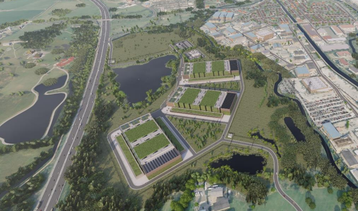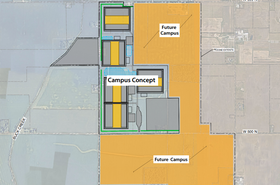Environmental campaigners are launching a legal challenge after the UK government approved plans for a data center on greenbelt land in Buckinghamshire.
As reported by DCD last month, Deputy Prime Minister Angela Rayner overruled local planners to give the go-ahead for the 90MW hyperscale data center on a former landfill site in Iver, Buckinghamshire.
Now tech equity group Foxglove, along with environmental charity Global Action Plan, have said they are opposing the decision via a planning appeal, which was issued this week and filed to the government and all interested parties.
Environment and power concerns
The groups cite the impact on the environment and the strain the data center will place on the power grid as reasons for their appeal.
Foxglove said: “Bafflingly, [the government] didn’t even bother to do an Environmental Impact Assessment – a baseline for any construction project that could have any significant effect on the surrounding area, let alone one likely to make as big of an impact as a new hyperscale data center.”
It said the data center will draw power from existing grid resources, warning: “When data centers compete with households and businesses for power from the grid in a local area, it tends to result in rocketing energy prices.”
Prior to Rayner’s decision, Buckinghamshire Council had twice turned down the proposal, from developer Greystoke Land and the UK arm of industrial services multinational Altrad.
In 2022, the local authority refused plans for a 163,000 sqm (1.75 million sq ft) data center campus spanning three buildings. Former Conservative Secretary of State Michael Gove upheld the refusal after it was appealed by Greystoke Land and Altrad UK, citing a lack of “very special circumstances” that would outweigh the harm of “inappropriate development in the green belt.”
The council then turned down a scaled-back planning application last year over similar grounds of inappropriate development in the green belt and harm to the air quality, protected species’ habitats, and appearance of the area.
A spokesperson for Greystoke said the data center “meets a vital national need for digital infrastructure.
“Modern data centers play a key role in advancing scientific research, medical diagnostics, and sustainable energy,” they said. “The data center campus incorporates measures which benefit the environment, including appropriate building standards, solar panels, and heat pumps.”
DCD has contacted the Ministry of Housing, Communities, and Local Government for comment.
UK government walking data center “tightrope”
Since taking office last year, the UK government has signalled its intention to speed up the construction of data centers. A report released earlier this year said the country needs to find an additional 6GW of AI-capable compute capacity by 2030 to remain competitive with other countries on AI.
Changes to the government’s planning policies in England made in February now allow for development on so-called ‘grey belt’ lower quality green belt areas. This change has required local authorities to accommodate sites for data centers, which the government has designated as ‘critical national infrastructure’.
The Iver development is the third time that Rayner, via Housing and Planning Minister Matthew Pennycook, has stepped in to approve the construction of a data center despite local opposition, including her recent decision to allow Greystoke Land to build a £1bn ($1.32bn) data center in Abbots Langley, Hertfordshire.
Matthew White, managing partner of law firm Herbert Smith Freehills Kramer’s real estate practice, told DCD the government’s aggressive stance towards getting digital infrastructure built is likely to lead to more opposition. “The ability to balance environmental priorities with the UK’s ambition to become a world leader in AI is no simple task,” White said. “It’s a tightrope the government is attempting to walk, whilst being buffeted by arguments from both sides of the debate.”
He said it is “essential that government, planning authorities, investors and developers all work together if we are to achieve the step change that the country needs.”
White continued: “Those responsible for planning must also consider local needs, including how data centers can support their local communities. This might mean focusing on the co-location of data centers with other employment-generating uses in digital technology hubs, or utilising waste energy as a heating source for local residents.”
He added that though Rayner’s decision “signals that central government is willing to put policy into practice when schemes come forward, the onus is on local planning authorities to identify appropriate sites for data centres, while ensuring they can support – and are supported by – local infrastructure.”
More in Construction & Site Selection
Read the orginal article: https://www.datacenterdynamics.com/en/news/angela-rayner-faces-legal-challenge-over-decision-to-allow-green-belt-data-center-in-buckinghamshire-uk/










